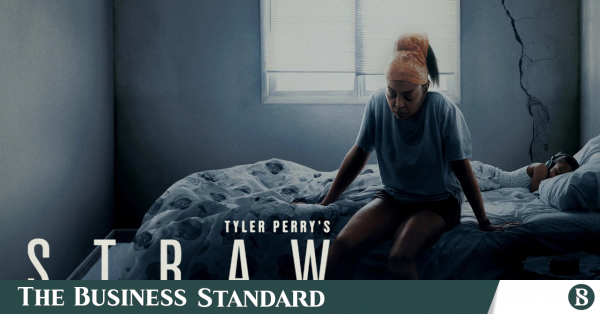Straw: Survival, sacrifice, and the weight of being a black single mother

Netflix’s latest psychological thriller ‘Straw’, directed by Tyler Perry, presents a tense and emotionally layered narrative that keeps viewers on edge from start to finish.
The film follows a single mother caught in a single, harrowing day as she becomes entangled in a series of escalating events, culminating in a murder, a misunderstanding and a dramatic bank standoff.
While Straw does deliver a twist ending that aligns with the film’s core themes, it leans heavily on shock value rather than offering a genuinely earned surprise. Although emotionally compelling and tightly constructed, the climax feels somewhat contrived for dramatic impact rather than an organic revelation.
The protagonist, Janiyah, a single mother who works two jobs to make ends meet, can barely afford to pay rent for the hot, dump and dingy apartment, and we see how she faces a cascade of life-changing challenges in a single day.
From losing her job to becoming entangled in a bank hostage situation, this film features the patterns of systematic failures and personal resilience.
Taraji P Henson definitely delivers a powerful performance as Janiyah, grounding the film’s authenticity. She plays the character of a middle-aged woman caught in the aftermath of a brutal crime that slowly unveils her sanity, sense of justice, and grasp on reality.
Henson shows up on the screen with a mixture of raw vulnerability and fierce strength so that her role can balance both pain and determination in a painstakingly beautiful way that few actresses could. Overall, her portrayal of personal agony and grief is haunting and multi-layered. Every look, every pause, every breakdown feels tragically real.
What makes the film so compelling is its straightforward storyline and the clarity with which the plot unfolds. Despite its simplicity, the narrative is layered with emotional depth and psychological complexity, particularly through characters who authentically embody the long-term struggles and traumas faced by black women.
The cinematography maintains a moody, intimate tone, effectively capturing the internal world of the protagonist, Janiyah. This visual approach allows viewers to connect deeply with the mental and emotional landscape of Taraji P Henson’s character. Additionally, the film’s slow, deliberate pacing enhances the tension, with quiet, unsettling moments gradually building to powerful, often haunting revelations.
The movie mixes a couple of serious issues like systematic racism, poverty and bureaucracy with an ambitious narrative that successfully conveys the emotional depth and urgency. In an attempt to bring the audience into Janiyah’s world, the first 30 minutes are relentlessly dramatic.
Since the beginning, one can expect to get quick cuts, full-on shouting, crazy antics, drama, and bloodshed. It almost borders on melodrama, but thankfully, Straw never tips over the edge into farcical waters. Gradually, the movie slows down considerably as we start to get some more ideas about Janiyah’s life. Janiyah’s daughter, Aria, suffers from seizures and has asthma; she also seems to be bullied at school, though it’s never outright said, which portrays the reason why Janiyah’s world is how it is.
The movie never seems all that invested in bringing forth the stories of the other cast, though instead keeping the attention parallelly on Janiyah and, to a lesser extent, Raymond, the detective who is also a single mother. Beyond that, everyone else is pretty much a one-dimensional archetype.
Furthermore, the pacing could have been better for what is unexpectedly a 105-minute thriller. From the middle act of the movie, the day-night transitions in particular are wild and puzzling and then again, the rain comes out of nowhere.
Sherri Shepherd, who’s typically at her best going for laughs, shines as the sober bank manager who remains empathetic in the crisis situation and afterwards comes out by saving Janiyah from the entangled mental turmoil that she has been keeping in denial.
Teyana Taylor was equally impressive as the detective hostage negotiator who pretty much advocates for Janiyah and serves as a ray of hope to look forward to during the crisis. The only letdown in her performance was her wig, probably that is very much on-brand for Perry.
But yet again, it’s Henson who delivers the powerhouse performance while successfully carrying out the emotional range from distress to anger to winsome compassion by the end of the movie.
Other than the plot and other technical aspects of the movie, there are two such powerful lines from the movie that really struck a chord. One of the hostages says “people don’t know how expensive it is to be poor” and “as bad as it is, there is always someone out there doing worse.”
Honestly, being poor for a lifetime is genuinely costly. One missed payment, a sudden illness, or an unexpected emergency can throw everything off balance—and that cycle often never ends. Poverty isn’t just about not having money; it’s about the ongoing struggle to stay afloat in a world full of expenses and unforgiving systems.
In the end, the poor end up paying in time, stress, and countless unseen burdens.





